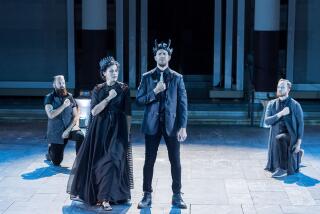Ovid’s Vivid Myths, Retold With Passion
- Share via
It is hard for us to imagine the life of the ancient world, to get the feel of it. So much of our modern intellectual life is based on ancient intellectual life--in philosophy, mathematics, history, literature--that we’ve come to assume that what the two worlds have in common wipes out or softens any differences.
In actuality, it doesn’t. The more closely you look at the ancient world, the stranger it becomes: The gods who run the world are startlingly human; only the sacrificial blood of animals keeps the world in place; and what seems (to us) to be unchanging forms are, in the ancient mind, fundamentally unsettled or in constant mutation.
That common perception about change is the theme of the Roman poet Ovid’s massive work “Metamorphoses,” a treatment of Greco-Roman myths in verse that dwells upon the changefulness of forms.
Ovid’s vivid stories have been a prime source of inspiration for English poets from Chaucer to Shakespeare on down. Ted Hughes, England’s present poet laureate, has re-created 25 of Ovid’s numerous tales in a modern English version that crackles with the vigor and the passion of the original.
His rendition of the story of the hunter Actaeon, who surprised the goddess Diana bathing in a woodland pool with her nymphs, is a good example of Hughes’ method in this book.
In all of the tales presented, Hughes writes in free verse with varying stanza constructions and, for Actaeon’s story, he uses 60 stanzas of triplets. He begins:
Destiny, not guilt, was enough
For Actaeon. It is no crime
To lose your way in a dark wood.
It happened on a mountain where
hunters
Had slaughtered so many animals
The slopes were parched red with
the butchering places.
When shadows were shortest and
the sun’s heat
hardest
Young Actaeon called a halt:
‘We have killed more than enough
for the day . . . ‘
Actaeon, “making a beeline home from the hunt,” stumbled on the bathing place. He couldn’t help himself. He stared at the goddess’ naked body, and Diana “blushed like a dawn cloud” and reached for a weapon. She had only water:
So she scooped up a handful and
dashed it
Into his astonished eyes, as she
shouted:
‘Now, if you can, tell how you saw
me naked.’
That was all she said, but as she
said it
Out of his forehead burst a rack of
antlers.
His neck lengthened, narrowed,
and his ears
Folded to whiskery points, his
hands were hooves,
His arms long slender legs. His
hunter’s tunic
Slipped from his dappled hide.
With all this
The goddess
Poured a shocking stream of panic
terror
Through his heart like blood.
He had become a stag. Bounding away, Actaeon was caught by his fellow hunters:
He wished he were among them
Not suffering this death but observing
The terrible method
Of his murderers, as they knotted
Muscle and ferocity to dismember
Their own master.
Hughes’ versions of these tales of Ovid are robust English poetry in themselves. They open the door for modern readers into that strange world in which Ovid and his contemporaries lived two millenniums ago.
Hughes started translating Ovid’s poetry when he contributed three poems to a book of translations, “After Ovid,” published not long ago by Farrar, Straus and Giroux.
Readers should be glad that he did; although the publisher says Hughes plans no more, he has at least given us this small, sturdy treasure.
More to Read
Sign up for our Book Club newsletter
Get the latest news, events and more from the Los Angeles Times Book Club, and help us get L.A. reading and talking.
You may occasionally receive promotional content from the Los Angeles Times.





